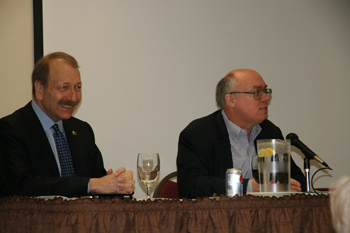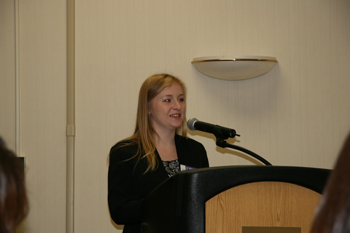Campus News
Faculty, administrators and legislators discuss potential $500 million cut to UC system
State legislators, UCSC administrators and faculty members spoke of the proposed half-billion-dollar cut to the University of California budget at a spirited forum in Santa Cruz.



Gov. Jerry Brown’s proposed half-billion-dollar cut to the University of California budget is so enormous, it’s hard to visualize the impact. What does a potential $500 million reduction look like, and how might it affect UC Santa Cruz? And what can the UCSC community do about it in the meantime?
Those were some of the hard questions that educators, faculty members, students and political leaders posed Friday during the second annual UCSC Legislative Forum, prompted by the newly elected Brown’s proposed state budget package.
If approved as-is by the Legislature, the 2011-12 budget would reduce public spending by $12.5 billion, including the half-billion-dollar UC cut.
But several speakers at the forum, which drew 70 people to the UCSC Inn in Santa Cruz, emphasized that the outcome will be much bleaker unless the governor succeeds in his push to bring a ballot measure to California’s voters this June, potentially extending a temporary increase in income, vehicle and sales taxes, a measure that Republican state legislators oppose.
If supporters get the measure on the ballot, they must make an all-out push to get the word out to voters in June, said State Senator Joe Simitian, D-Palo Alto, who attended the forum. “If the measure is not put on the ballot, or if it is defeated in June, you’re talking about another $500 million (cut) for the UC system,” he said.
Under such a scenario, “it is almost unthinkable to imagine what will happen,” UCSC said Chancellor George Blumenthal, who moderated the event.
“Nobody likes to pay taxes, but the question is, how do we as a society join together to be part of a shared solution and share the pain?” said 27th District Assemblyman Bill Monning, D-Carmel, also in attendance. He added that the absence of a ballot measure would result in UC having to “close institutions.”
Based on how UCSC fared during past budget cutbacks, the campus’s share of the cuts could be $31 million, equal to the cost of educating 1,500 students, UCSC Provost and Executive Vice Chancellor Alison Galloway told the crowd.
“That’s the entire budget of our Physical and Biological Sciences Division, or our School of Engineering and our Arts Division combined,” Galloway said.
Galloway mentioned a familiar rallying cry at protests – “cut the administration.” In response, she said potential cutbacks are so massive that UCSC would have to eliminate its entire Business and Administrative Services Division—including police, fire, environmental health and safety services, human resources, physical planning and construction, transportation and parking, grounds and custodial services—to absorb the cut.
All the while, she said, UCSC would still have obligations and rising mandatory costs. For instance, campus contributions to the pension system increased $4.2 million this year, and are projected to rise another $4 million, Galloway said.
She also mentioned ways UCSC saved money and stretched itself thin before the latest dire budget news. Last year, Galloway said, campus-wide furloughs, which reduced paychecks between four and 10 percent, saved $12.5 million “but it was one-time savings. We don’t get that money back.”
Such cuts have already left UCSC in a weakened state, she said, and further cuts could make the entire UC system “increasingly vulnerable” to competitors who are trying to hire faculty away.
Professor of ocean sciences Peggy Delaney, UCSC’s Vice Chancellor for Planning and Budget, said the campus has already eliminated funding for 80 faculty positions, along with 110 quarters of teaching assistant time. She said that UCSC has worked hard to protect core academics, but with a reduction in funding for faculty positions, the campus has been forced to cut classes.
At first UCSC “started on the edges” by chopping discussion sections from some general education courses and reducing the number of electives, but now cuts are impacting primary classes that students need to graduate, she said.
UCSC’s Student Union Assembly representative, Amanda Buchanan, talked about fees and tuition rising at the same time that students are witnessing a reduction in available classes and services.
“If classes are cut, we will not be able to graduate in four years,” Buchanan said.